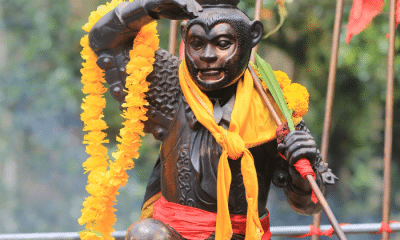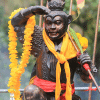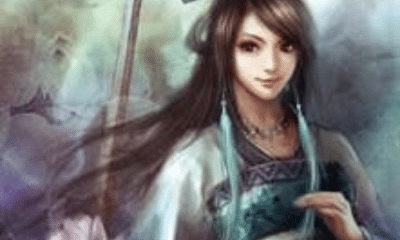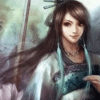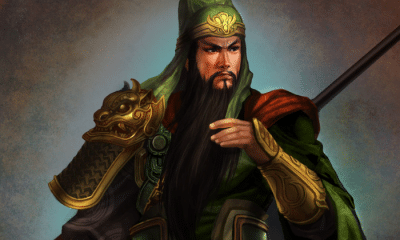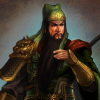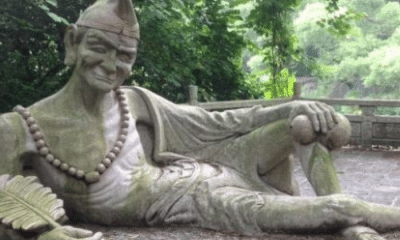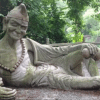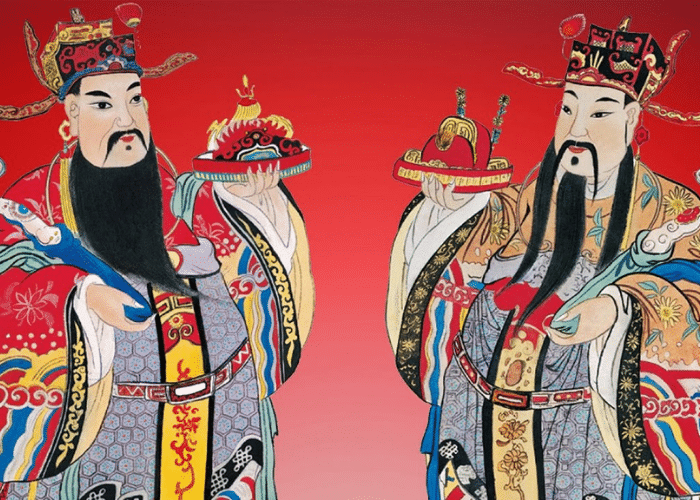
Chinese
The Menshen: The Guardians of Gates and Doorways
The Menshen: The Guardians of Gates and Doorways
If you have ever seen a pair of armed guards or wise scholars on a doorway, you’ve seen the Menshen. So who are these guardians of China’s doors and gates?
Menshen is a term applied to a variety of doorway deities in Chinese culture.
The most common type of Menshen are military figures. These deified generals ward off negative energy, malicious spirits, and would-be criminals.
There are also civil Menshen. They are shown as scholars and artists who bring good luck, wealth, and happiness into the building.
Some temples have a third type of Menshen at the gates. These are the most ancient type, deities in service of the more powerful gods to whom the temples are dedicated.
Menshen have their roots in ancient tradition, but they can still be seen in Chinese culture today. Like Western lion gates, the Menshen continue a tradition that dates back to ancient mythology and folklore.
The First Menshen Guards
According to the Chinese novel Journey to the West, the first Menshen were generals named Qin Shubao and Yuchi Gong.
The story began when the Dragon King of the Jade River made a bet with the great fortune-teller Yuan Shoucheng over who could foretell the next day’s weather more precisely.
Because the Dragon King could control rain he assumed he would win. The Jade Emperor, however, commanded him to follow Yuan Shoucheng’s prediction and lose the bet.
The arrogant dragon ignored the Jade Emperor and won the bet instead. Yuan Shoucheng, however, had known the dragon’s identity all along and orchestrated the bet with the knowledge that he would not intentionally lose.
For his disobedience to the Jade Emperor, the Dragon King was sentenced to death. Wei Zheng, an advisor to Emperor Taizong, the Great Ancestor of the Tang Dynasty, would arrive the next day at noon to cut off his head.
The Dragon King begged Emperor Taizong to have mercy on him. Taizong took pity on the dragon and tried to distract Wei Zheng at the time of execution.
The emperor summoned his minister to play go with him in the morning, dragging the game on until after noon. Wei grew so tired that he fell asleep at the table.
Emperor Taizong was pleased, until he received news that a dragon’s head had fallen from the sky. Wei Zheng’s spirit had traveled to Heaven as he slept to carry out the Jade Emperor’s order.
The spirit of the Dragon King was anger at Emperor Taizong for not keeping their agreement. He haunted the emperor every night so that he could not sleep.
Two of Taizong’s generals, Qin Shubao and Yuchi Gong, volunteered to guard his door at night so the emperor could sleep. This meant that they did not sleep, however, so the Great Ancestor felt guilty for their constant vigilance.
The emperor commanded his greatest artists to paint the generals’ portraits on his doors. The dragon’s spirit was fooled by the skillful paintings and the emperor and his guardians were able to sleep without being bothered by the dragon’s spirit.
My Modern Interpretation
The story of Qin Shubao and Yuchi Gong’s portraits rationalized the practice of painting guardians on doors, but they were not the first such Menshen.
Some of the earliest written texts from ancient China described the practice of giving offerings to doorway spirits. By the time of the Han Dynasty, beginning in 202 BC, the gods Shenshu and Yulu were often painted on doors as Menshen.
Qin Shubao and Yuchi Gong replaced these ancient gods and became the first generals to be commonly painted on doors. To this day, they are the most common military Menshen.
Other deified generals are sometimes used, however. The military door gods protect the building and its occupants from outside threats.
Another type of Menshen eventually developed called the civil door gods. These are deified scholars and artists who are thought to attract positive influences, such as wealth and good luck.
A third type of Menshen are seen on the doors and at the gates of temples. These are deities who are associated with the specific god worshipped within.
Doorways and gates received special attention in many ancient cultures. As liminal spaces, they were thought to be a point of weakness between the safety of the interior, be it the home, the city, or the temple, and the threat of the outside.
The Menshen are just one type of doorway guardians that developed around the world. The Roman god Janus watched doorways in Europe while the Dvarapala, weapon-wielding giants, were carved outside of Hindu temples in India.
This tradition has continued around the world. Guardian figures like lions and eagles are still common in Western architecture.
In China, the traditional Menshen are still frequently seen on the doors of both homes and businesses. Today, however, they are not formally recognized as part of the Taoist doctrine.
Instead, Menshen are placed on doorways as a nod to tradition. They are seen as both an element of folklore and as a decorative element.
Few modern buildings use traditional painting techniques for their portraits of the Menshen. Instead, mass-produced prints are pasted to doors.
Among modern Chinese people, the replacement of these Menshen images is often part of the celebration of the Lunar New Year. Refreshing the image renews its powers, whether they be the guardianship of the military Menshen or the blessings of the civil Menshen.
The placement of Menshen, whether as prints or sculptures, is part of the popular practice of feng shui. One rule of feng shui is that the two Menshen should always face one another to prevent any negativity from entering behind their backs.
In Summary
The Menshen are doorway guardians in Chinese culture.
Like many other ancient societies, the Chinese saw doorwarys and gates as liminal spaces. The Menshen were painted or carved on doors to ward off the evils that could enter through these openings.
According the legend, the first Menshen were generals of Emperor Taizong, the Great Ancestor of the Tang. When the spirit of a dragon haunted the emperor, two of his most loyal generals volunteered to guard his door throughout the night.
Rather than have his generals go entirely without sleep, the emperor had their portraits painted on the doors to trick the dragon’s ghost into believing he was well-guarded. In later years, many generals were painted as military door gods to ward off spirits and negative energy.
Emperor Taizong’s generals were not the first Menshen in history, however. Protective deities were known to watch over China’s doors from its earliest history, and are often still shown doing so outside temples.
A third type, the civil Menshen, were developed later. These deified artists and scholars are thought to attract positive energy and allow good fortune to enter.
While the Menshen are not formally recognized in modern Taoism, they remain popular in China as both a tradition and a decorative element. Modern Menshen are usually printed images that are replaced at the New Year to keep their images, and benefits, fresh.
The Menshen grew out of some of the ancient world’s oldest traditions and continue today as a poplar element of Chinese design and folk religion.
The Menshen: The Guardians of Gates and Doorways
If you have ever seen a pair of armed guards or wise scholars on a doorway, you’ve seen the Menshen. So who are these guardians of China’s doors and gates?
Menshen is a term applied to a variety of doorway deities in Chinese culture.
The most common type of Menshen are military figures. These deified generals ward off negative energy, malicious spirits, and would-be criminals.
There are also civil Menshen. They are shown as scholars and artists who bring good luck, wealth, and happiness into the building.
Some temples have a third type of Menshen at the gates. These are the most ancient type, deities in service of the more powerful gods to whom the temples are dedicated.
Menshen have their roots in ancient tradition, but they can still be seen in Chinese culture today. Like Western lion gates, the Menshen continue a tradition that dates back to ancient mythology and folklore.r images, and benefits, fresh.
The Menshen grew out of some of the ancient world’s oldest traditions and continue today as a poplar element of Chinese design and folk religion.


